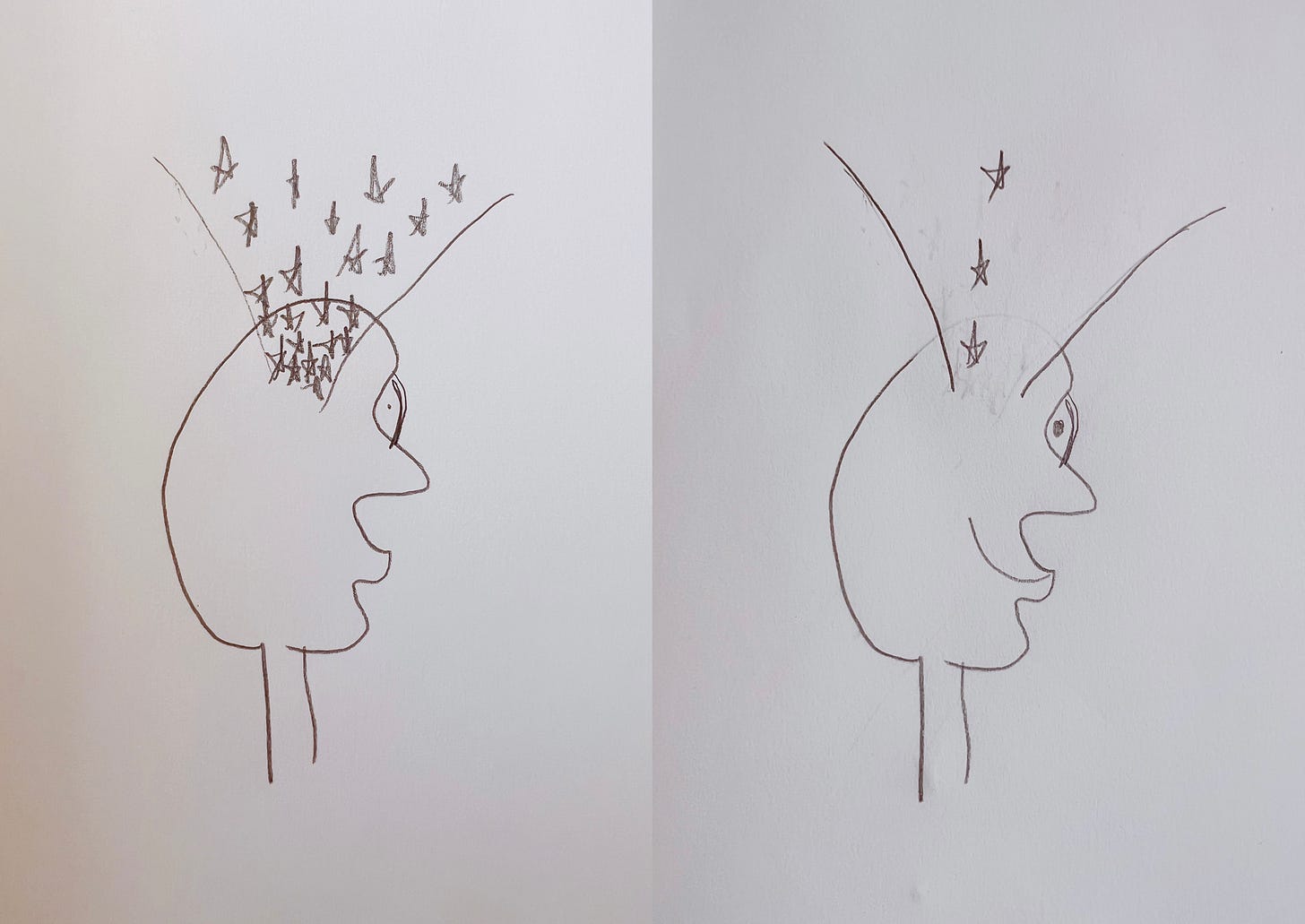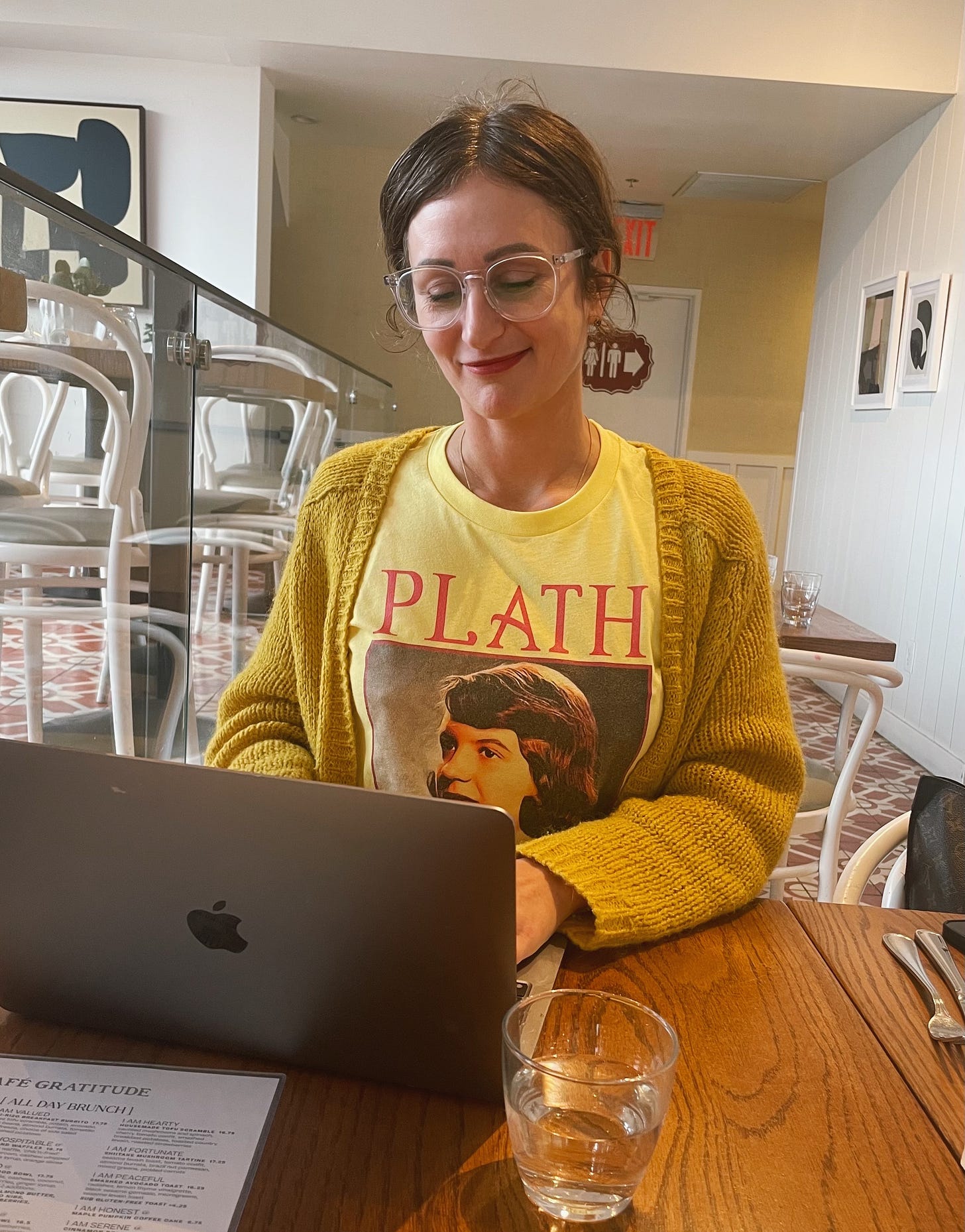#46 Maybe we're not supposed to be making sense of all this
“A society of anecdotes without a narrative”
A few months ago I went to meet a friend at a bookstore. I was early so I walked up to a display shelf to browse the staff recommendations. The first book I picked up was about work as tyranny and the second one I picked up was about how to fix burnout and the third one was about forming habits to excel at work and the rest were the same kinds of book, either post-modern commentaries on the institutions out to get us or some guide on how to win at the institutions out to get us1. My friend walked in a few minutes later and I started waving one of the books around like a maniac and I said something dramatic, such as: I simply cannot examine the fucking things I’m supposed to be upset about anymore. She laughed, but mostly because she doesn’t read self-help or post-modern critique, and doesn’t know the particular kind of hell those of us that do can live in.
This was November maybe, definitely around the time I diagnosed formally for ADHD, which means this was around the time I’d purchased a handful of books on living with ADHD, subscribed to a few new YouTube channels on it, interviewed my friends who had it, and started examining the entirety of my life through the lens of neurodivergence. A family member who also diagnosed told me my life would change for the better with all this knowledge, that I would make a new kind of sense of myself, that I would be liberated, but all I felt like was a soup. It was a straw-breaking-the-camel’s-back kind of thing. I couldn’t deal with one more issue I was supposed to fix or navigate or accept or leverage. I didn’t care that it might explain so much. Leave me alone, let me procrastinate.
In 2010 I was running a small team of accountants at a startup in San Francisco, and I was obsessed with reading things like the Harvard Business Review and Wired and Bloomberg Businessweek because I was obsessed with concept of optimization. This was pre-peak-hack culture when Malcom Gladwell was still a person instead of a genre and no one was microdosing, when it could still be novel and thrilling to read about how to improve your team’s efficiency. And my team’s efficiency needed improvement, not because they weren’t crushing it (they were), but because one of them was losing patches of hair and I was keeping wine in my desk. We were stressed, and hacks were the way forward if you wanted the same output but also more joy and for Nick’s hair to be full.
One of the articles I read on efficiency told me there can be only so many inputs before the brain gets clogged like a traffic jam, which sounds obvious but was a revelation. I passed it around to my staff and told them we’d only work on a few priorities at a time because our brains were getting traffic jammed trying to do everything at once.
I don’t think it made a difference, I think we still just worked a lot and lost our hair, but I still think about that diagram a lot. Especially lately.

Not because I want to be more efficient, but because I feel there are too many data points to plot a narrative anymore, and any new received piece of information grinds the gears of my brain, and my ability to make sense of the world or myself, to a halt.
I read the long-form essay in the New York Times Magazine, “What Happened to Us”, on how the pandemic affected us individually and what that speaks to in terms of collective effect. The author dove into a set of oral histories and interviewed several experts, and essentially concluded we haven’t even begun to process it or sense-make of it. We’re still in the middle of it, the rest is TK.
The part of the article that stood out to me the most was the concept of “normlessness” or “anomie”, or what happens to humans in times of rapid societal change, “when a society’s values, routines and customs are losing their validity but new norms have not yet solidified.” We experience anomie when collectively we’re not that anymore, but we’re also not the next thing, either. Much like the personal liminality I was referencing in this piece, anomie is a fundamental ambiguity, experienced across a collective simultaneously, that we actively resist through our incessant need to sense-make and generalize and forecast.
Per the article, “Amid the anomie of the pandemic, there was hunger for any frame of reference”: a sentence that could explain a lot of things, like why that article on languishing became canonical; or why concepts like Ambiguous Loss, Fall Regression, Revenge Bedtime Procrastination, Goblin Mode, Quitting Season and Quiet Quitting and #girlloser and Hustle Culture, and dozens more syndromes, acronyms and hashtags have emerged to explain us and are often received as viral confirmation of some shared experience we’re desperate for; or why grief that lasts beyond a year became a certifiable, medicable mental illness. Because we did not know what was happening, and we still do not, and that is intolerable.
“A society of anecdotes without a narrative”2. A brain with too many inputs.
I’m not sure what point I’m trying to make here, and maybe that is what the point is: that perhaps we’re not supposed to try so hard to make it all make sense, or come up with some unified theory to save us from experiencing what is happening. Maybe we’re supposed to feel insecure. Maybe this is the time we’re supposed to dissolve instead solidify. Maybe the new narrative comes when we begin to make room for it. Maybe right now, we’re just supposed to be lost.
Ten Things Right Now
A really good movie, a really good shirt, a really good song, two new studies on women and drinking, articles about how we’re all tired and don’t want to work, tips on how to want to live again, a chilling collection of studies on what social media is doing to girls, a messy apartment, Beer Poster TikTok, what comes after Cocaine Bear.
Related (to this week’s essay): How to embrace ‘wintering’ when your ambition is tapped
Still related: Feeling awe is good for us, and Katherine May on how to feel alive again. I cannot agree more with these two articles. The past few years, leaning into what’s in front of me and really, really paying attention to it and allowing myself to be wooed by the mundane and the gorgeous and the ordinary and the extraordinary has been life giving.
The movie Emily, which I took myself on a date last Friday night to see along with every other single, bookish, cat-owning, Blundstone’s wearing middle-aged lady. It was excellent, 5/5 recommend.
This shirt I got on Etsy
“If you’re a woman, then you get your tubes tied, so you don’t bring any more drug babies into the system.” A eugenic-flavored suggestion for how to end addiction.
First Cocaine Bear, then Meth Gator
“Where is all the research into how much potential fathers are drinking or smoking?” A very good question that brought me back to that study that showed when women hold a beer they are perceived as less human. In related “we seriously have to have a study for this shit” news, research now shows women are able to recall with accuracy the details of sexual assault even if they have drunk moderate amounts of alcohol.
I love George Saunders just so much. This note on rejection, but also on what we’re really working on when we’re writing, is perfection. “I really feel that always we are working, not on behalf of that book, but on behalf of the next one. In this sense, we are always, perennially, doing warm-up exercises, for that ultimate book that, we hope, we'll never quite get to.”
A virtual-tour of Julia Fox’s cluttered, messy-ish apartment, that I watched a while ago but keep thinking about because it makes me feel okay.
A heavily researched article that shows yes, social media is fucking up girls, substantially: “We are now 11 years into the largest epidemic of teen mental illness on record. As the CDC’s recent report showed, most girls are suffering, and nearly a third have seriously considered suicide. Why is this happening, and why did it start so suddenly around 2012?” It’s absolutely worth the time it will take to read it. On a personal note: I have been using social media (Instagram), for 30 minutes to an hour per week, and not much more than that. I scroll for a few minutes or check DMs maybe once a day but usually once every few days, I rarely post unless it’s to share something I’ve written or someone else’s work, and I can confirm unequivocally that this has absolutely made me a happier person and made significant and noticeable improvements to my creativity, attention, and self-regard.
Related: The beer poster TikTok trend
To be sure, my book spans both genres
From the referenced article “What Happened To Us?”






